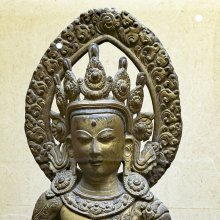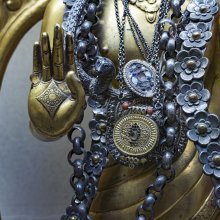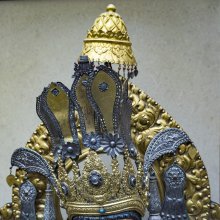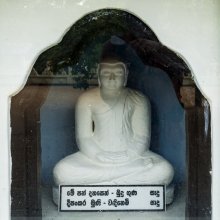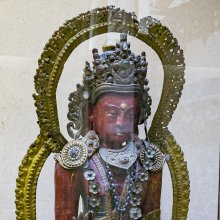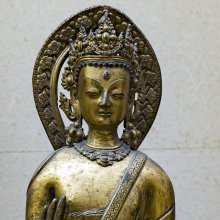Dipankara, Dīpaṅkara, Dīpaṃkara, Dipamkara, Dīpaṅkarā: 11 definitions
Introduction:
Dipankara means something in Buddhism, Pali, Hinduism, Sanskrit. If you want to know the exact meaning, history, etymology or English translation of this term then check out the descriptions on this page. Add your comment or reference to a book if you want to contribute to this summary article.
Images (photo gallery)
(+12 more images available)
In Buddhism
Theravada (major branch of Buddhism)
Source: Pali Kanon: Pali Proper NamesThe first of the twenty four Buddhas.
He was born in Rammavati,
his father being King Sudeva (v.l. Sumedha) and
his mother Sumedha.
For ten thousand years he lived in the household, in three palaces, Hamsa, Konca and Mayura.
His wife was Paduma and his son Usabhakkhandha (Samavatakkhandha).
He left home on an elephant and practised austerities for ten months.
His Bodhi tree was the Pipphali and grass for his seat was given by an Ajivaka named Sunanda.
His first sermon was preached at Nandarama (Sunandarama) at Sirighara, where he converted the heretics.
He had three great gatherings of his followers.
He was always attended by eighty four thousand arahants, and his body was eighty cubits in height.
He died at Nandarama at the age of one hundred thousand years and his thupa was thirty six yojanas high.
Sumangala and Tissa were his chief monks,
Nanda and Sunanda his chief nuns, while
Sagata (v.l. Nanda) was his constant attendant.
Tapassu and Bhallika were his chief lay patrons among men and Sirima and Sona among women.
It was during the time of Dipankara Buddha that the ascetic Sumedha (q.v.), who later became Gotama - Buddha, first declared his intention of becoming an aspirant for Enlightenment (a Bodhisatta).
After Dipankaras death, his doctrine lasted for one hundred thousand years. Bu.ii.207ff; BuA.104f; J.i.29; Mhv.i.5; Dpv.iii.31; DhA.i.69; but see Mtu.i.193ff., where the details differ from those given here.
2. Dipankara - See Buddhappiya.
Theravāda is a major branch of Buddhism having the the Pali canon (tipitaka) as their canonical literature, which includes the vinaya-pitaka (monastic rules), the sutta-pitaka (Buddhist sermons) and the abhidhamma-pitaka (philosophy and psychology).
Mahayana (major branch of Buddhism)
Source: Wisdom Library: Maha Prajnaparamita SastraDīpaṃkara (दीपंकर) is the name of a Buddha according to the 2nd century Mahāprajñāpāramitāśāstra (chapter XV).—Accordingly, “The Buddha Dīpaṃkara was called Dīpaṃkarakumāra, “prince, lighter of lamps” because when he was born, all the extremities of his body were like lamps. When he became Buddha, he was still called Dīpaṃkara”.
According to Chapter LI, “for twelve years after he had attained abhisaṃbodhi, the Buddha Jan-teng (Dīpaṃkara) only emitted light rays (raśmi) and, as there was no one to understand him, did not preach the Dharma”.

Mahayana (महायान, mahāyāna) is a major branch of Buddhism focusing on the path of a Bodhisattva (spiritual aspirants/ enlightened beings). Extant literature is vast and primarely composed in the Sanskrit language. There are many sūtras of which some of the earliest are the various Prajñāpāramitā sūtras.
Tibetan Buddhism (Vajrayana or tantric Buddhism)
Source: Wisdom Library: Tibetan BuddhismDīpaṃkara (दीपंकर) is the name of a Tathāgata (Buddha) mentioned as attending the teachings in the 6th century Mañjuśrīmūlakalpa: one of the largest Kriyā Tantras devoted to Mañjuśrī (the Bodhisattva of wisdom) representing an encyclopedia of knowledge primarily concerned with ritualistic elements in Buddhism. The teachings in this text originate from Mañjuśrī and were taught to and by Buddha Śākyamuni in the presence of a large audience (including Dīpaṃkara).

Tibetan Buddhism includes schools such as Nyingma, Kadampa, Kagyu and Gelug. Their primary canon of literature is divided in two broad categories: The Kangyur, which consists of Buddha’s words, and the Tengyur, which includes commentaries from various sources. Esotericism and tantra techniques (vajrayāna) are collected indepently.
General definition (in Buddhism)
Source: WikiPedia: BuddhismDipankara one of the Buddhas of the past, said to have lived on Earth one hundred thousand years.
Theoretically, the number of Buddhas having existed is enormous and they are often collectively known under the name of "Thousand Buddhas". Each was responsible for a life cycle. According to some Buddhist traditions, Dipankara (also Dipamkara) was a Buddha who reached enlightenment eons prior to Shakyamuni, the historical Buddha. Generally, Buddhists believe that there has been a succession of many Buddhas in the distant past and that many more will appear in the future; Dipankara, then, would be one of numerous previous Buddhas, while Shakyamuni was the most recent, and Maitreya will be the next Buddha in the future.
(Sanskrit and Pali Dipamkara, "Lamp bearer"; Chinese (pinyin Randeng Fo); Tibetan mi slob; Mongolian Jula yin Jokiya and gamma;ci, Dibangkara, Nepal Bhasa: Dipankha)
Languages of India and abroad
Pali-English dictionary
Source: BuddhaSasana: Concise Pali-English Dictionarydīpaṅkara : (adj.) one who lights a lamp; name of the former Buddha.

Pali is the language of the Tipiṭaka, which is the sacred canon of Theravāda Buddhism and contains much of the Buddha’s speech. Closeley related to Sanskrit, both languages are used interchangeably between religions.
Sanskrit dictionary
Source: Cologne Digital Sanskrit Dictionaries: Edgerton Buddhist Hybrid Sanskrit DictionaryDīpaṃkara (दीपंकर).—(= Pali id.; in Pali the first of the 24 Buddhas; here sometimes, e.g. Sukhāvatīvyūha 5.6, first of a much longer list of Buddhas, but often named without any such preëminence), name of one of the most celebrated of former Buddhas: his story told at length in the ‘Dīpaṃkara- vastu’ Mahāvastu i.193.13 ff.; incomplete list of references, Saddharmapuṇḍarīka 22.3; 27.4; Lalitavistara 5.4; 172.19; 185.15; 253.16; 415.19; Mahāvastu i.1.13; 2.1; 3.3; 57.13; 61.11; 170.3; 227.6 (his name is given to him); iii.239.10 ff.; 241.13; 242.19; 243.20; 244.13; 247.3; 248.3; Mahāvyutpatti 95; Divyāvadāna 246.5 ff.; Gaṇḍavyūha 104.13; 222.2; Vajracchedikā 26.18; Sukhāvatīvyūha 5.6; 76.10; Karmavibhaṅga (and Karmavibhaṅgopadeśa) 102.15; 155.9; Aṣṭasāhasrikā-prajñāpāramitā 48.10. Also, in verses m.c., Dīpa, Dīpakāra, Dīpasaha.
--- OR ---
Dīpaṃkara (दीपंकर) or Dīpasaha.—m.c.: Dīpasahena ti Lalitavistara 11.11 (verse), so read as suggested by Lefm. in Crit. App. for text °sahenāsti.
Source: Cologne Digital Sanskrit Dictionaries: Aufrecht Catalogus CatalogorumDīpaṃkara (दीपंकर) as mentioned in Aufrecht’s Catalogus Catalogorum:—son of Nānākara, grandson of Nidhānakara: Aśvavaidyaka.
Source: Cologne Digital Sanskrit Dictionaries: Monier-Williams Sanskrit-English DictionaryDīpaṃkara (दीपंकर):—[=dīpa-ṃ-kara] [from dīpa > dīp] m. ‘light-causer’, Name of a mythical Buddha, [Monier-Williams’ Buddhism 136]
[Sanskrit to German]
Sanskrit, also spelled संस्कृतम् (saṃskṛtam), is an ancient language of India commonly seen as the grandmother of the Indo-European language family (even English!). Closely allied with Prakrit and Pali, Sanskrit is more exhaustive in both grammar and terms and has the most extensive collection of literature in the world, greatly surpassing its sister-languages Greek and Latin.
Kannada-English dictionary
Source: Alar: Kannada-English corpusDīpaṃkara (ದೀಪಂಕರ):—
1) [noun] he who gives light or who enlightens.
2) [noun] Gautama Buddha, the founder of Buddhism.
Kannada is a Dravidian language (as opposed to the Indo-European language family) mainly spoken in the southwestern region of India.
See also (Relevant definitions)
Starts with: Dipankara Nagara.
Ends with: Atishadipamkara, Coliya Dipankara.
Full-text (+71): Atisha, Dipamkarajnana, Coliya Dipankara, Dipa, Dipakara, Usabhakkhandha, Talissara, Padmavana, Tanhankara, Sumedhakatha, Sudipa, Baladicca, Megha, Sirighara, Dipasaha, Sumati, Sunandarama, Makuta Cetiya, Pajjamadhu, Dure-idana.
Relevant text
Search found 37 books and stories containing Dipankara, Dīpaṅkara, Dīpaṃkara, Dipamkara, Dīpaṅkarā, Dipam-kara, Dīpaṃ-kara, Dipankra, Dīpaṅkra; (plurals include: Dipankaras, Dīpaṅkaras, Dīpaṃkaras, Dipamkaras, Dīpaṅkarās, karas, Dipankras, Dīpaṅkras). You can also click to the full overview containing English textual excerpts. Below are direct links for the most relevant articles:
Apadana commentary (Atthakatha) (by U Lu Pe Win)
Dipankara Buddha predicts Buddhahood for Sumedha < [Part 1 - Remote preface (dūre-nidāna)]
Gaining Of Perfections By Bodhisat < [Part 1 - Remote preface (dūre-nidāna)]
The Great Chronicle of Buddhas (by Ven. Mingun Sayadaw)
Buddha Chronicle 1: Dīpaṅkarā Buddhavaṃsa < [Chapter 9 - The chronicle of twenty-four Buddhas]
Chapter 5 - The Prophecy < [Volume 1.1]
Supplement (a): Brief Statement of Future Buddha Gotama’s Live < [Chapter 9 - The chronicle of twenty-four Buddhas]
A Brief Outline of Buddhism (by U Po Sa)
The gods of northern Buddhism (by Alice Getty)
Formal Education System in Ancient India (by Sushmita Nath)
The Odantapurī university < [Chapter 3 - Centres of Learning in Vedic and Buddhist Period]
The 8th century Vikramaśilā Mahāvihāra < [Chapter 3 - Centres of Learning in Vedic and Buddhist Period]
Guide to Tipitaka (by U Ko Lay)
Part 14 - Buddhavarfnsa Pali < [Chapter VIII - Khuddaka Nikaya]
